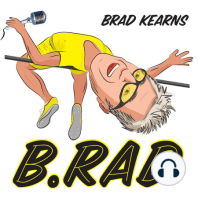83 min listen

Managing Digital Distraction and Hyper-connectivity While Staying Focused, Productive, and Stress-Balanced, Part 1 (Breather Episode with Brad)
Managing Digital Distraction and Hyper-connectivity While Staying Focused, Productive, and Stress-Balanced, Part 1 (Breather Episode with Brad)
ratings:
Length:
31 minutes
Released:
Sep 6, 2019
Format:
Podcast episode
Description
(Breather) This is a pretty important topic, and it’s something we all deal with daily. I talk through some great articles on the subject and offer a bunch of personal insights about stuff I do well, as well as the stuff I really suck at! In part 1, I focus on the positive things I have going in my daily routine, and in part 2, I get into the stuff I struggle with, and ideas we can all use to make things better. This all started when I read a great article written by Nir Eyal for Medium.com. In this article, Eyal details how researchers say our ability to pay attention is equal parts focusing and ignoring. Irrelevant information bogs down our ability to suppress distraction, especially as we age. Ouch! So, in order to increase our ability to focus, researchers suggest both boosting our ability to concentrate as well as reducing distraction. How do you reduce your chances of being distracted? Use one screen, one browser window, and one computer program at a time. Keep your physical and virtual desktop tidy. This one is key. The average American spends 2.5 days a year looking for lost documents. You don’t want to waste your time like that, especially when you can keep your space clean by putting in a little bit of time every week to ensure everything is organized. What about increasing your ability to concentrate? Try: Exercise, meditation, and spending time in nature may help boost cognitive control. Some cognitive exercises and immersive action video games also seem to improve our ability to focus. Julie Morgenstern, author of the book Never Check Your Email In The Morning, told the Huffington Post that when you check your email (or notifications) first thing in the morning, “you will never recover.” In other words, much like Harris explained in his post for Thrive Global, your focus is pretty much shot when you begin your day with your eyes glued to your phone — or, at least, your focus won’t be what it could have been, if you’d only started your day off differently. Morgenstern explained, “It’s hard to go from your transactional, shallow part of your brain, the frontal cortex, to the other parts of your brain where strategy happens and relationships happen. It’s easier to start in the deep recesses of your brain and go to the shallow parts.” Basically, Morgenstern is saying that your mind sort of goes all over the place when you scan your email or notifications as soon as you wake up, and it can leave you feeling directionless and overwhelmed as you move forward with your day. But if you start off with something important and focused in the morning, Morgenstern explained, you’ll be well on your way to feeling, as well as actually being more productive. This show is filled with helpful tips and useful strategies you can employ in order to ensure your days are as productive and distraction free as possible. Unfortunately, it is all too easy to get sidetracked, so you must be deliberate about how you spend your time and prioritize tasks. For example, when you’ve got something you have to do, you should first consider how long that task will take. Is it five minutes? Three minutes? If it’s longer than 60 seconds, then just put it on your to-do list. Otherwise, that’s how you lose time. Five minutes here and there really adds up! Speaking of to-do lists, have you tried Evernote? I have been using this organizational App for some time now and I’ve found it extremely helpful for keeping my notes organized and easily accessible. Then there are the other things you can do to help yourself, like spending time in nature. As I explain in the show, spending time in nature improves our cognitive control. Even gazing at a large body of water prompts a powerful, calming parasympathetic response, because it allows you to finally relax. You don’t have to go to a lake or the beach during the work day – who has time for that? – but you can simply incorporate photos of natural scenery into your work environment.
Released:
Sep 6, 2019
Format:
Podcast episode
Titles in the series (100)
Dave Kobrine : Livin' The Dream by The B.rad Podcast